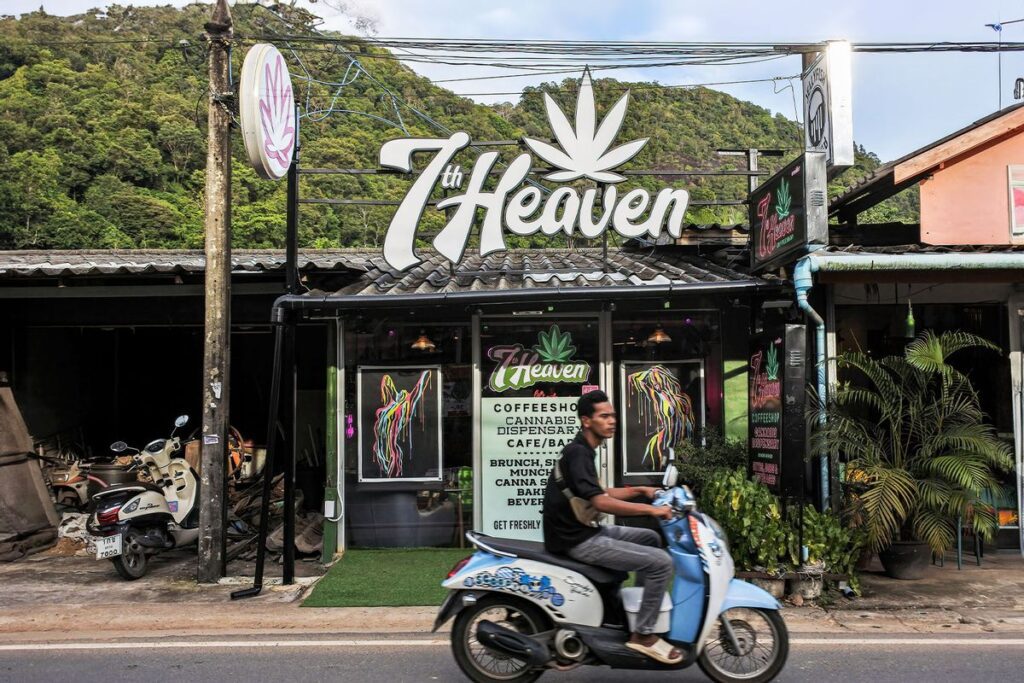As Thailand embraces its complex relationship with cannabis, the rapid evolution of its legal status has captivated both locals and tourists alike. In Bangkok, cannabis shops have proliferated, often outnumbering the traditional Buddhist temples that define the city. With vibrant psychedelic artwork and a laid-back atmosphere, these shops cater to a burgeoning demand for cannabis, offering everything from premium strains to affordable rolls.
The Rise of Cannabis in Thailand
On June 9, 2022, Thailand marked a historic milestone by becoming the first Asian nation to decriminalize cannabis after decades of strict prohibition. The government removed cannabis from the list of dangerous narcotics, signaling a progressive shift in policy. While public consumption remained technically illegal, the practicalities of enforcement evaporated, with many prisoners released on that very day, ushering in what many called de facto legalization.
– **Key Changes**:
– Cannabis removed from the narcotics list as of June 2022
– Thousands of prisoners set free
– A burgeoning cannabis industry developed overnight
The Historical Context of Cannabis in Thailand
Historically, cannabis, known locally as *ganja*, has been intertwined with Thai culture for centuries. Originating likely from India, it was traditionally used as an herbal remedy and a flavoring agent in various dishes, such as the famous boat noodle soup.
Contrastingly, cannabis became illegal in 1934 under international agreements. The intensity of enforcement waxed and waned until the Vietnam War, during which heightened scrutiny led to rigorous anti-drug policies. The 1979 Narcotics Act introduced severe penalties for cannabis distribution, significantly swelling prison populations.
The Path to Legalization
The push for legalization gained momentum in the early 2010s, particularly after military intervention in 2014 brought the issue to the forefront. Activists, like Arun ‘Max’ Avery of Highland café, played pivotal roles, organizing events and engaging the public in discussions about cannabis as a health remedy. By 2018, the government allowed medical marijuana, setting the stage for broader reform.
– **Activism Highlights**:
– Highland café started as a pro-cannabis platform
– Public seminars brought together various stakeholders
– Medical marijuana legislation passed in 2018
The Economic Boom
With the legalization of cannabis, a multi-billion baht industry emerged almost overnight. Although officially intended for medicinal use, cannabis quickly became accessible in tourist hotspots like Koh Phangan and Khaosan Road.
– **Thriving Cannabis Culture**:
– Over 4,500 dispensaries across Thailand
– Cannabis-infused culinary offerings
– Events such as stoned yoga classes and blunt-rolling workshops
However, this rapid commercialization also sparked moral panic among the public. Concerns resurfaced over cannabis being equated with harder drugs, leading to debates over its social implications.
Backlash and Regulatory Challenges
In recent months, new political considerations have threatened the cannabis community. Opposition parties leveraged the cannabis issue in electoral campaigns, leading to fears of a crackdown on the burgeoning industry. Despite promises from the ruling parties, proposals emerged to reclassify cannabis as a dangerous narcotic, endangering the progress made.
– **Political Maneuvers**:
– Opposition parties call for stricter regulations
– Surveys show 80% of the public favors a repeal of legalization
– Heightened tensions between lawmakers, activists, and the cannabis community
The Activist Response
In response to these developments, the Thai Cannabis Future Network organized sit-ins and hunger strikes, demanding careful examination of cannabis’ health effects. Activists urged the government to recognize that cannabis usage is not more harmful than alcohol and should be manageable under a regulatory framework.
In a surprising turn of events on July 23, Deputy Prime Minister Anutin Charnvirakul announced that the government would pivot towards regulation rather than criminalization. This decision came as a relief to many within the cannabis community, allowing them to continue operations with oversight rather than outright bans.
Looking Ahead: The Future of Cannabis in Thailand
Although the near future of Thailand’s cannabis landscape remains uncertain, the government’s commitment to regulation could signify a balanced approach toward both control and accessibility. With estimates suggesting the cannabis economy could exceed $1 billion by 2025, it appears the Thai government is keen to explore this lucrative avenue, albeit with caution.
– **Future Considerations**:
– Ongoing debates over recreational vs. medicinal use
– Potential new reforms, including easing restrictions on other substances like opium and psilocybin mushrooms
– Overall societal acceptance and utilization of cannabis in public life
The trajectory of cannabis in Thailand reflects broader global trends toward legalization yet also highlights the challenges of navigating entrenched social norms and political landscapes. As the situation evolves, it remains crucial for stakeholders, including activists and businesses, to engage actively in this dialogue.


